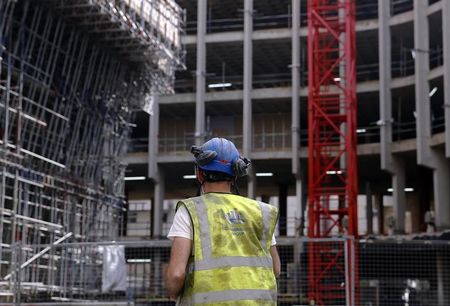LONDON (Reuters) - British construction output stagnated in July, causing the annual growth rate to sink to an eight-month low as rapid expansion in private house building started to level off.
Construction output was unchanged on the month in July, compared with growth of 1.2 percent in June, the Office for National Statistics said on Friday.
On an annual basis, output rose 2.6 percent in July, the slowest rate of growth since November and down from June's three-month high of 5.3 percent.
The construction sector was hit hard by the financial crisis but has been recovering since last year along with the broader economy, buoyed by falling unemployment and strong consumer and business confidence.
A separate survey carried out by Markit recently showed Britain's construction industry expanded at its fastest pace in seven months in August, boosting job creation but also putting strain on suppliers.
On a three-monthly basis - which strips out some volatility in the data - construction output was up 0.6 percent, compared to a flat outturn in the three months to June, the ONS said.
A recovery in housing which started late last year had been a major driver of construction growth in 2014, but it is now showing tentative signs of tailing off.
Private sector home building rose 1.1 percent on the month in July, down from 2.0 percent in June. The annual growth rate slowed to a five-month low of 15.9 percent.
Housing now accounts for more than a quarter of new building work.
The weakening growth trend for new housing looks set to continue, with orders in the second quarter of 2014 down 4.3 percent, compared with a 3.8 percent rise for all new work.
The ONS highlighted a 9.6 percent rise in private commercial orders, driven by plans for new shopping centres.
Private-sector surveys have painted a mixed picture of the housing market recently.
The Royal Institution of Chartered Surveyors and mortgage lender Halifax on Monday pointed to slowing momentum behind rising house prices in August, while Bank of England data last week showed mortgage approvals dipped in July.
But another major mortgage lender, Nationwide, last week said house prices jumped 0.8 percent in August, beating forecasts.
There were no revisions to previous construction output figures on Friday because the ONS is changing to the way it calculates the output of different industries, which will result in new revisions dating back to 1997.

(Reporting by Andy Bruce and David Milliken)
